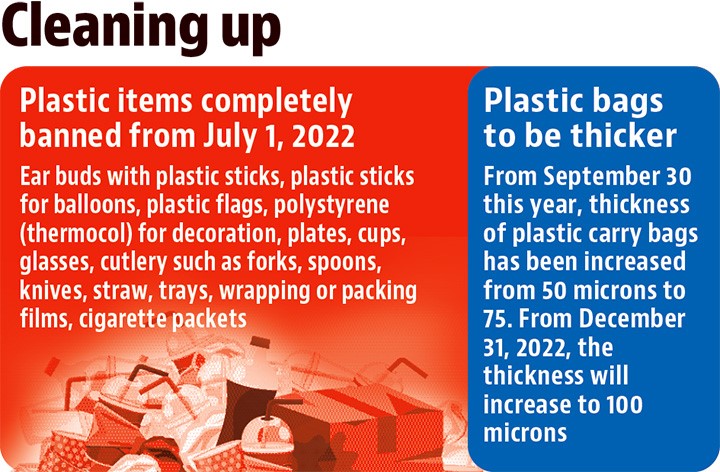[ad_1]

Context:
The Plastic Waste Management Amendment Rules notified by the Centre acknowledge the gravity of pollution caused by plastic articles of everyday use, particularly those that have no utility beyond a few minutes or hours.
The decisions follow recommendations made by an expert group constituted by the Department of Chemicals and Petrochemicals two years ago.
In 2018, India won praise globally for asserting on World Environment Day that it would eliminate all single-use plastic by 2022, a theme that Prime Minister Narendra Modi has stressed more than once.
Yet, policy coherence to achieve the goal has been lacking.
Plastic waste problem around the globe:
Pollution due to single use plastic items has become an important environmental challenge confronting all countries.
- Only nine percent of the plastic waste produced between 1950 and 2015 was recycled globally, according to a study by researchers from the University of California, Santa Barbara, and others.
- Out of the nine per cent, only 10 per cent was recycled more than once; 12 per cent was incinerated, and 79 per cent ended up in landfills or oceans and other water bodies.
- As much as 3.3 million metric tonnes of plastic waste was generated in India in 2018-19, according to the Central Pollution Control Board (CPCB) report 2018-19.
- This roughly translated to 9,200 tonnes a day (TPD). The total municipal solid waste generation is 55-65 million tonnes; plastic waste is approximately 5-6 per cent of the total solid waste generated in the country.
- Currently, the Plastic Waste Management Rules, 2016, prohibits manufacture, import, stocking, distribution, sale and use of carry bags and plastic sheets less than 50 microns in thickness in the country.
- The Prime Minister of India was also conferred the “champions of the earth” award by the United Nations Environment Programme (UNEP) in 2018 for pledging to eliminate all single-use plastic by 2022.
India is committed to take action for mitigation of pollution caused by littered Single Use Plastics.
Plastic Waste Management Amendment Rules, 2021:
- The Environment Ministry has notified the Plastic Waste Management Amendment Rules, 2021.
- These rules prohibit specific single-use plastic items which have “low utility and high littering potential” by 2022.
- The permitted thickness of the plastic bags, currently 50 microns, will be increased to 75 microns from 30th September, 2021, and to 120 microns from the 31st December, 2022.
- Plastic bags with higher thickness are more easily handled as waste and have higher recyclability.
- At the policy level, the concept of Extended Producer Responsibility (EPR), already mentioned under the 2016 Rules, has to be promoted.
- EPR is a policy approach under which producers are given a significant responsibility, financial and/or physical for the treatment or disposal of post-consumer products.
- The Central Pollution Control Board, along with state pollution bodies, will monitor the ban, identify violations, and impose penalties already prescribed under the Environmental Protection Act, 1986.
- The Central Pollution Control Board has reported that 22 States have, in the past, announced a ban on single-use plastic, but this has had little impact on the crisis of waste choking wetlands and waterways and being transported to the oceans to turn into microplastic.
Reasons for the Ban on single use plastic:
- Plastic is so cheap and convenient that it has replaced all other materials from the packaging industry but it takes hundreds of years to disintegrate.
- If we look at the data, out of 46 million tonnes of plastic waste generated every year in our country, 43% is single use plastic.
- At about 34 lakh tonnes generated in 2019-20, India has a staggering annual volume of plastic waste, of which only about 60% is recycled.
- What is more, a recent study of the top 100 global producers of polymers that culminate in plastic waste found six of them based in India.
- It is unsurprising, therefore, that in spite of the staggering problem, policymakers have been treading on eggshells.
- The international view is changing, however, and support for a UN Plastic Treaty is growing; the majority of G7 countries too are supportive of cleaning up the oceans through a charter in the interests of human wellbeing and environmental integrity.
- India’s policies on environmental regulation are discordant, lofty on intent but feeble on outcomes, and plastic waste is no different.
- State governments have felt no compulsion to replace municipal contracts, where companies are paid for haulage of mixed waste, with terms that require segregation and accounting of materials.
Way Forward:
- As consumers, we should ensure that all plastic waste leaving our homes is segregated and is not contaminated with food waste.
- Managing plastic waste requires effective knowledge, not only among those who produce the plastic but also among those who handle it.
- The brand owner and manufacturer should try and understand the fates a plastic packaging material would meet after its purpose of packaging has been served.
- Citizens have to bring behavioural change and contribute by not littering and helping in waste segregation and waste management.
- To encourage innovation in development of alternatives to identified single use plastic items and digital solutions to plastic waste management, the India Plastic Challenge – Hackathon 2021, has been organized for students of Higher Educational Institutions and start-ups recognized under Start-up India Initiative.
Conclusion:
Considerable amounts of plastic waste cannot be recycled because of lack of segregation, leading to incineration, while mixing newer types of compostable plastic will confound the problem.
Patchy regulation has led to prohibited plastic moving across State borders.
Now that the Centre has adopted a broad ban, further pollution must end.
Microplastic is already found in the food chain, and governments must act responsibly to stop the scourge.
[ad_2]

